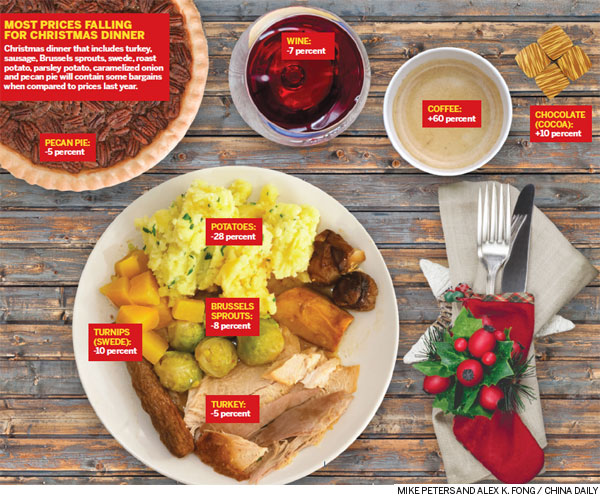

Falling food prices mean cooking at home for the holidays can be a sweet deal this year, Mike Peters reports.
Mindy Yan is trolling the aisles of Jenny's Shop with a big smile. The Chinese-American from San Francisco has enjoyed laying out a Christmas spread every year since her family came to Beijing in 2009, but the cost of a dinner for her own family of three and her sister's family of five has varied wildly over those years.
But 2014 is going to be one of the good years. She'll pay 48 yuan/kilo ($7.71) for her imported turkey instead of last year's 58 yuan. There are imported peas in the freezer, but she'll take the popular Chinese brand Weili instead, hovering between the 250-gram packages (5.5 yuan) and a jumbo 1,000g bag (20.2 yuan). And her favorite taste of the holidays, Ocean Spray cranberry sauce, is 16.9 yuan for a 379-gram can.

"Yes, I think making Christmas dinner will be cheaper this year," says Jenny Wang, general manager of Jenny's Shop in the capital's suburban district of Shunyi.
Globally, prices for foodstuffs are down, and commodities analysts in the UK recently told the Financial Times that the overall cost of a turkey dinner should be down about 5 percent in 2014, after three years of rising prices. That Christmas bonus is reflected in the aisles of Chinese stores like Jenny's Shop, where shelves are stocked with imported goods sought by expat customers.
China's farms paint a similar picture: While greenhouse-grown vegetables are seeing a seasonal price rise, root vegetables that are musts on the holiday plate are now bargains. The average wholesale price of potatoes was 1.98 yuan per kg on Dec 16 nationwide, down 0.77 yuan per kg as compared with the same period last year, according to ymt360.com, an agricultural goods information and trade website. Sweet potatoes' wholesale price, meanwhile, fell from 1.93 yuan per kg at the beginning of December to 1.5 yuan last week.
The price of raw milk price dropped by more than 1,100 yuan per ton in December as compared with February, according to Wang Yonggang, president of an animal husbandry company based in Qingdao. However, dairy products haven't seen an evident fall in price at supermarkets.
Shoppers for imported dairy are already seeing some savings, however. New Zealand's Anchor butter continues to be the best deal at grocery stores around Beijing: about 21 yuan for a 227-gram package, while a popular Danish brand runs about 50 percent higher.
Fans of pecan pie, a holiday favorite in the US, have experienced the wildest price fluctuation over the past two years. In 2012, China's entry into the US pecan market pushed prices sky-high: Wholesale prices climbed as much as 50 percent as growers scrambled to meet the country's fast-growing appreciation for the nuts. The calendar added more pressure: The Thanksgiving-Christmas season is the peak demand time for pecans in the US, but because Chinese New Year came early that year - demand stayed very high into January.
This year, a combination of good weather and a late Spring Festival in 2015 is keeping pecan prices more stable. Small nut size in Georgia has dropped the harvest forecast from 85 million to 70 million pounds for 2014, but Texas - the other big pecan producing state - enjoyed a wet fall and production there will total about 60 million pounds, nearly double last year's weak harvest.
The FAO's Food Price Index, which tracks prices of cereals, meat, dairy products, vegetable oils and sugar on international markets, is at its lowest since August 2010. Grain prices are at a four-year-low, according to the UN Food and Agriculture Organization.
If coffee and chocolate loom large in your holiday feasting, however, that could limit your savings. Arabica bean prices have soared more than 60 percent due to the drought in Brazil at the start of the year, and cocoa is about 10 percent higher thanks to unfavorable weather and Ebola fears in the producing regions of western Africa.
But if a Christmas ham is the centerpiece of your Christmas feast, you're in luck. Chinese pork's wholesale price stood at 13.61 yuan per kg last week, hitting bottom rock the week of Dec 15, thanks to slack market demand and an expanding pig breeding business. But that may not last, experts warn: Increasing costs in heating and winter disease prevention and control could bring prices up later, straining budgets for holiday celebrations by Chinese New Year on Feb 19.
While low food prices globally keep the cost of many imported foods down for grocery shoppers, that doesn't automatically mean Christmas dinner at a fancy hotel will be cheaper, too. Rent and transportation costs are up, canceling out any savings. Importers and top hotel food-and-beverage managers say the price of Christmas dinners they serve will be about the same this year as last.
Contact the writer at michaelpeters@chinadaily.com.cn
Yang Feiyue contributed to this report.